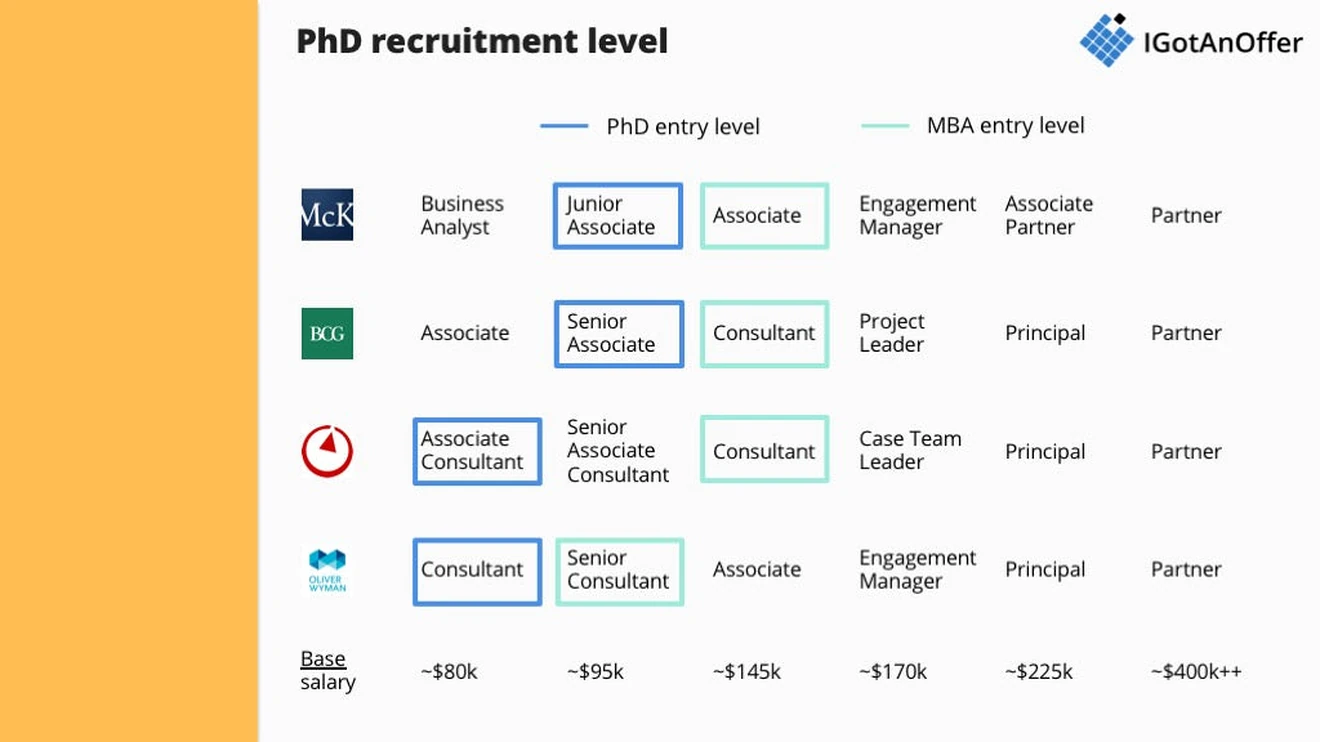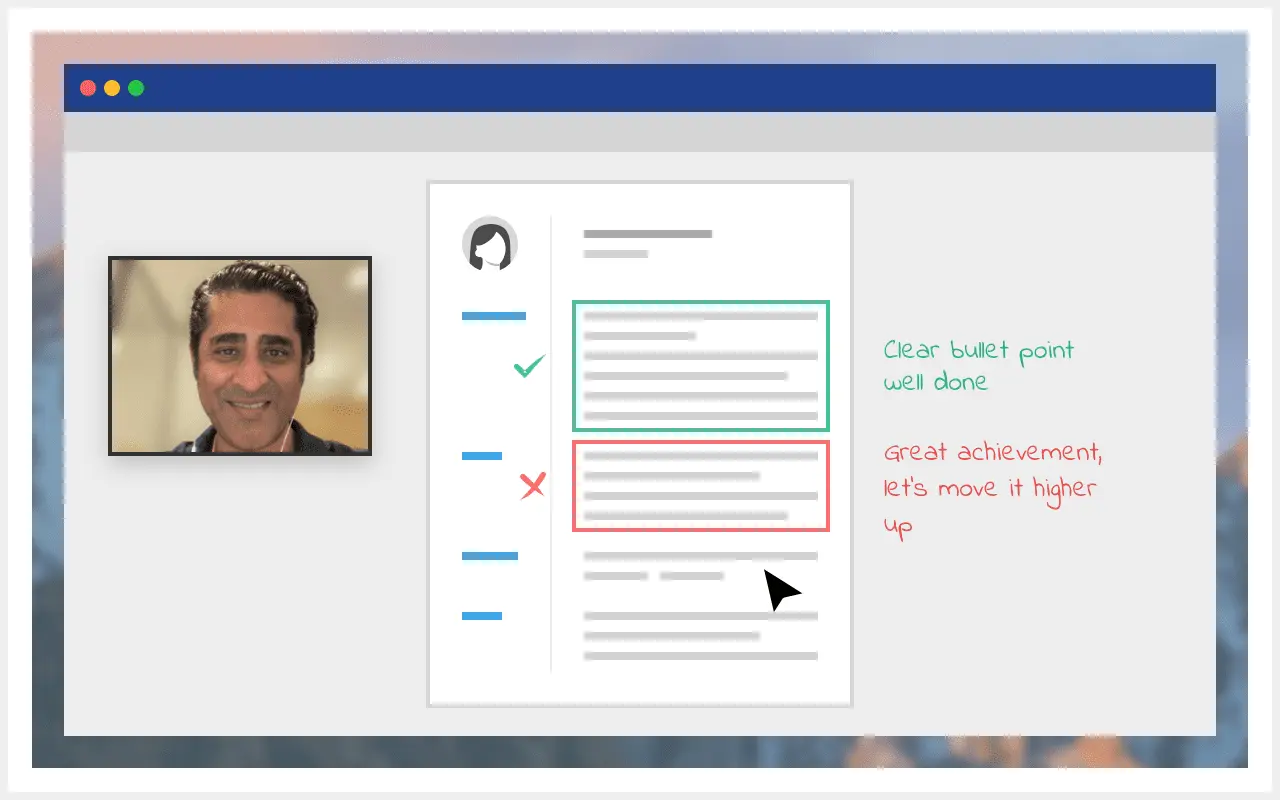Going from PhD to consulting can feel intimidating. It's hard to know which consulting firms recruit PhDs, and at which level. And it can also sometimes feel unclear if you'll be using your PhD skills at all or completely starting from scratch.
So let's walk through how you should manage your transition from PhD to consulting step by step. From which firms to target to how much you will be paid and how to ace your applications and interviews.
Click here to get expert help on your resume from a consultant recruiter
Which companies recruit PhDs and at which level?
Consulting firms help clients solve some of the most difficult problems they face in their business. As a consequence, firms like McKinsey, BCG and Bain have always been competing with each other to recruit the smartest talent possible. Historically, top consulting firms were mainly hiring MBAs but that has changed over the past few decades and they now also target undergraduate and PhD students.
However, not all firms recruit PhDs at the same level. Some firms like Bain or Oliver Wyman recruit PhDs at their undergraduate entry level which they respectively call Associate Consultant and Consultant. This recruiting approach can feel a little bit frustrating as a PhD given you've spent much more time studying and also usually have more work experience than a typical undergraduate.
But the good news is that some firms have started to recognise this issue and to hire PhDs at the level just above the entry level one. This most notably includes McKinsey and BCG which respectively hire PhDs at Junior Associate and Senior Associate levels. As you can see in the graph below, these are equivalent levels despite the fact that the two firms call them differently.

As you've probably understood by now, McKinsey and BCG are great firms to target as a PhD because you will get in a at higher level than other firms which has got a few advantages:
- First, you'll receive a higher base salary from the start. ~$95k instead of the typical ~$80k for undergraduate entry level.
- Second, you'll be further along in your career and be given more responsibility from day one.
If you want to target these two firms, we would recommend taking a look at the recruiting events they regularly organise for PhDs: the McKinsey Insight Programme and the Bridge to BCG Programme. Both are one to two day workshops during which you get a chance to network with people from McKinsey / BCG, participate in realistic case experiences and get a better feel for whether you'd enjoy being a consultant. We would definitely encourage you to apply if you can.
In addition, if you have done a PhD in life sciences, we would also encourage you to take a look at consulting firms which have a strong focus on healthcare and pharma. This includes LEK, ClearView, Navigant and ZS Associates among others. These are smaller firms than McKinsey or BCG in terms of size but they have a strong culture of hiring PhDs and could be a good addition to your list.
Finally, McKinsey, BCG and the other consulting firms we have mentioned above take part to the PhD to consulting conference every year in the UK. We would recommend attending if you are based in London.
Why should you become a management consultant?
Need to get more clarity on your next steps? See our guide to the best career transition coaches
Consulting is intense and your interviewers will want to make sure you have carefully thought about why you want to become a management consultant. In our experience here are the top 3 aspects of management consulting that are most relevant to PhD students.
First, management consulting is not completely unlike doing research. A big part of a management consultant's job is to solve client problems. Going to work for firms like McKinsey or BCG will therefore give you the opportunity to continue using the skills you have developped while doing your PhD: from gathering data, to breaking down problems into manageable pieces and to articulating your ideas in a structured way. Here are a few case examples if you want a more precise idea of the type of projects consultants work on.
Second, one of the differences between management consulting and academia is the pace at which things go. You typically go less deep in the problems you solve in management consulting. But you are asked to solve them much faster. There's an emphasis on speed over depth. The bright side of this is that you will typically see the results of your work much faster as a consultant. On some projects you could even see your recommendations being implemented and have a direct impact on revenues / profits while you are still working at the client site.
Third, if you've decided academia isn't for you and are attracted to the business world, consulting can be a great stepping stone. McKinsey, BCG and Bain are sometimes referred to as "CEO factories" because a lot of their alumnus go on to manage Fortune 500 companies. For instance, both Sheryl Sandberg (Facebook COO) and Sundar Pichai (Google CEO) are former McKinsey consultants. Not all consultants go on to do great things but some do!
Having a clear idea of why you want to be a consultant is important because it's a demanding job which often involves long hours and a lot of travel.
How to land and ace consulting interviews?
Now that you know what firms to target, let's talk about the consulting application process. For most firms it looks something like this:
- Resume and cover letter
- Maths and logic test
- 1st round interviews
- 2nd round interviews
Each round of interview typically includes 2 to 5 interviews where you will be asked a mix of case questions and fit questions.
The first hurdle you will need to overcome is writing a great PhD consulting resume (template available here). Our four main tips to achieve this as a PhD student are as follows:
- First, you should use a consulting specific structure for your documents: "Education", "Work experience", "Extra-curricular achievements" and "Additional skills". There's no need for specific sections on your publications or the conferences you attended.
- Second, you should write result-oriented bullet points. This means all your bullet points should start with action verbs (e.g. lead, analyse, etc.) and quantify the impact you've had as much as possible (e.g. lead a collaboration between 4 researchers which resulted in 3 publications)
- Third, you should work hard to simplify the topic of your research. The person reviewing your resume won't know more about your field than the average Financial Times reader. You need to dumb it down for them. They don't need to understand what you did in detail. Conveying a high level idea of your field is often enough.
- Finally, some recruiters have small prejudice against PhD students. They think they are good problem solvers but lack soft skills. In your resume, you should therefore make every effort to show off your soft skills. Two easy ways to do this are to talk about the different collaborations you've worked on, and the different presentations you've made at conferences.
Once your resume and cover letter have been accepted you will need to start preparing for case interviews. This type of interviews lasts about 30 minutes during which you will analyse and solve a business problem. These cases are usually inspired from past consulting projects your interviewer will have worked on.
For example, your interviewer could ask you: "Your client is Coca-Cola, and their profits have been declining in recent years. Can you help find the root-cause of the profit decline and turn the situation around?"
We've helped more than 20,000 students prepare for consulting interviews in the past and in our experience the following four-step approach makes for a great preparation.
- First, you should aim to develop fast and reliable maths skills. All case interviews involve some maths but PhD students in sciences often underestimate that part because they are used to doing more complex maths in their research. But doing simple additions, subtractions, divisions and multiplications QUICKLY and ACCURATELY is a completely different skillset to solving complex integrals (as an example). It requires some practice!
- Second, the real secret to case interviews is CONSISTENCY. You will have 5 to 10 interviews before getting an offer. In order to succeed you therefore need to consistently crack cases. In our experience, the best way to achieve this is to always use the same step by step method. We've developed our own method which you can learn about in our case interview programmes. Or you can also develop your own.
- Third, you should practice as many case interviews as possible. Practicing with peers and playing the role of the interviewer / candidate in turns is extremely helpful. But in addition, we would also recommend practicing by yourself as this gives you more time to think about the questions and about the perfect answer you can give. In addition, some candidates also use a consulting interview coach to fine-tune their preparation.
- Finally, you should not forget to spend some of your preparation time on fit and PEI questions. These are questions such as "Why McKinsey?" or "Tell me about a time you lead a team through a difficult situation?" These are often overlooked by candidates but carry an important weight in interviewers' final decision.
Conclusion
Consulting can be a great stepping stone for PhD students who aren't willing to go into academia and would like to enter the business world. McKinsey and BCG are particularly active in the PhD recruiting space. And so are other smaller firms with a strong presence in healthcare and life sciences such as Navigant, Clearview or ZS Associates. Getting an offer in consulting can be a bit challenging but if you follow our guidance on resumes, cover letters and case interviews your chances are actually quite high.















